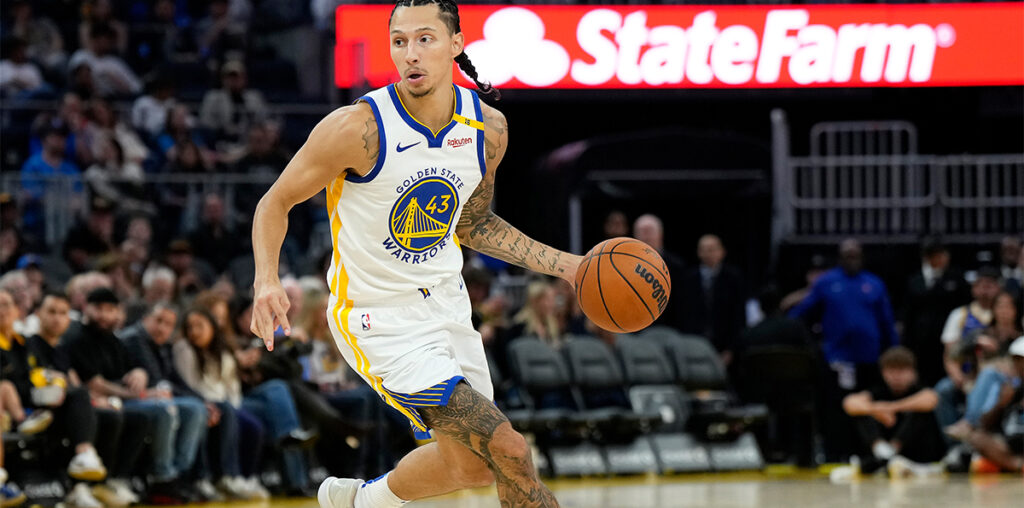How Waters’ indigenous pride fuels his incredible NBA journey originally appeared on NBC Sports Bay Area
SAN FRANCISCO – Though Lindy Waters III is undiscovered to much of America, he’s a welcome discovery to the Warriors and an emerging hero to a marginalized nation of millions.
When Golden State acquired Waters in a June trade with the Oklahoma City Thunder, it was because they valued his deep shooting ability. That’s his ticket to the NBA. The 6-foot-6 wing shot 43.5 percent from deep in limited action with the Thunder last season and through four preseason games is draining triples at a rate of 57.9 percent.
“I would say we’ve got 13 players who look like they’re rotation players to me, Lindy being one of them,” coach Steve Kerr said.
Through his early play with the Warriors, Waters is putting himself in position to amplify his platform. The more familiar he becomes to the average fan, the more Americans he can influence.
For Waters, 27, Indigenous Peoples Day on Monday is of particularly strong significance. He is that rare breed, an Indigenous NBA player. Born in Colorado, raised mostly in Oklahoma, he is a citizen of the Kiowa Nation and descendent of proud Cherokees. He is researching the Bay Area’s connection to the Indigenous community, he said after practice Monday, which coincided with Indigenous Peoples Day.
“There’s a lot to uncover,” Waters said. “I hear a lot about stories about Alcatraz and the surrounding tribes so I’m excited to learn more about that. But today is Indigenous Peoples Day, so I get to celebrate that with my people.”
Indigenous Peoples Day is a relatively new American holiday, slowly replacing Columbus Day and being acknowledged as the rightful original Americans.
More than five million Americans identify as Indigenous, but only Dallas Mavericks star Kyrie Irving (part Lakota), Milwaukee Bucks forward MarJon Beauchamp (Mission, Luiseño) and Waters share the ancestry and identify with the culture.
“Me, MarJon and Kyrie are the three main ones in the NBA that really carry that heritage with us,” Waters said. “And we take it upon ourselves to have that responsibility to be there for our community so getting to celebrate that with everybody around us is amazing.”
Waters has not always been comfortable with his connection to the Native American community; his father, Lindy Jr., and other descendants were closer to the tribal culture. Young Lindy’s awakening came later, in high school, and he now embraces everything that comes with being Indigenous.
Not long after Waters accepted a scholarship to play basketball at Oklahoma State, he was mentoring Native American children and holding basketball clinics specifically designed for a group that can feel isolated by life on the reservation.
He has since been named “Indian of the Year” by the American Indian Exposition. He conceived the “Lindy Waters III Foundation,” whose mission is to “enhance and support Native American youth and Indigenous communities through sports, health and wellness, and leadership programs.”
Though the played sparingly for the Thunder last season, Waters was one of five finalists for the NBA’s Social Justice Champion award, named after Hall of Famer Kareem Abdul-Jabbar.
And now, having departed Oklahoma and become a member of the high-profile Warriors, Waters hopes to make the most of his proximity to local and global culture.
“I was excited I was ready to get out of Oklahoma and just explore and become myself,” Waters said. “To learn more about myself off the court, get to meet new people, with new players. I was ecstatic and anxious to get here so it’s been great since I’ve been here.”
If he keeps shooting with anything close to his early efficiency, he’ll keep getting minutes with the Warriors and become a part of their new identity. They’ll shoot a lot of 3-pointers, which lines up neatly with Waters’ familial nickname: “Trey.”

